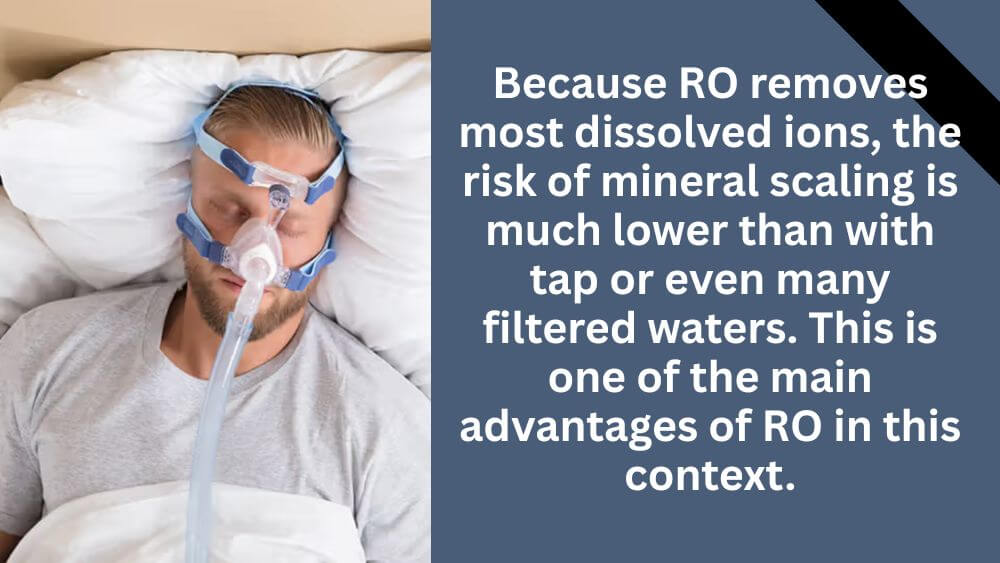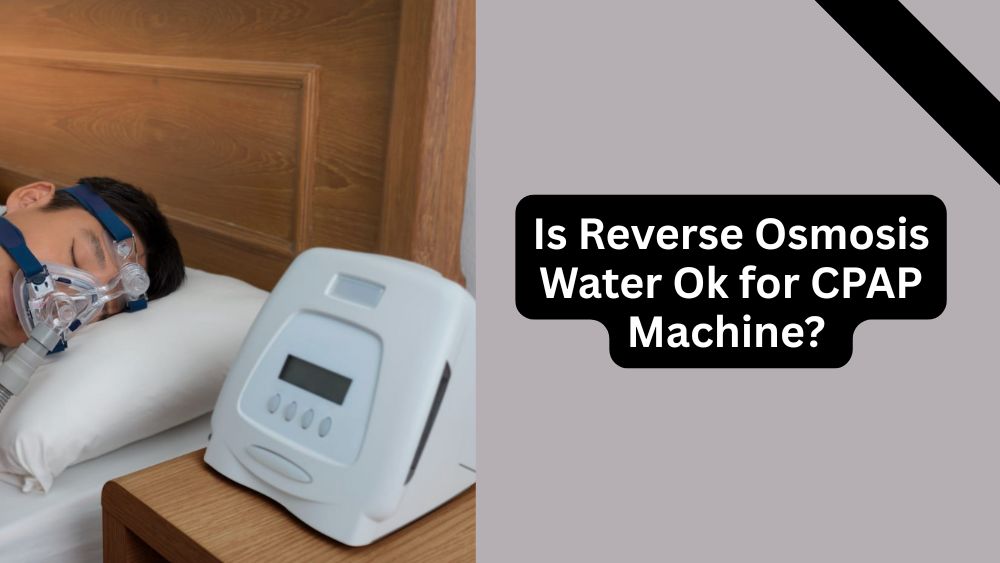If you use a CPAP machine, you know how crucial it is to maintain it properly. Ensuring you use the right type of water can make a big difference in the machine’s performance and your health.
You’ve probably heard about reverse osmosis water and might be wondering if it’s suitable for your CPAP machine. Choosing the wrong water can lead to mineral buildup, malfunctioning equipment, and even health risks. That’s why it’s essential to get it right.
Keep reading to discover whether reverse osmosis water is the best option for your CPAP machine, and ensure you’re making the safest and most effective choice for your nighttime breathing aid.

Reverse Osmosis Water Basics
Reverse osmosis water is safe for CPAP machines. It removes impurities, providing clean water for your device. Using it helps maintain the machine’s efficiency and longevity.
Understanding the essentials of reverse osmosis water can help you decide if it’s suitable for your CPAP machine. You might wonder if this purified water type can keep your device functioning smoothly. Let’s break down the basics and see how reverse osmosis water measures up.
What Is Reverse Osmosis?
Reverse osmosis (RO) is a water purification process that uses a semi-permeable membrane to remove impurities. It effectively filters out contaminants like chlorine, heavy metals, and dissolved salts. If you’ve ever thought about the purity of your drinking water, RO systems are a popular choice for households looking for cleaner, safer water.
Purity Levels In Ro Water
The purity of RO water often reaches impressive levels, removing up to 99% of impurities. This means it’s free from many of the contaminants that can clog or damage your CPAP machine. But, have you ever considered if this level of purity is too much?
While RO water is incredibly clean, it lacks the minerals found in regular tap water. For most, this isn’t a problem, but you should consider if your CPAP machine requires specific water types. Always check your device’s manual or consult with your healthcare provider.
Many CPAP users share that using RO water has reduced the buildup of mineral deposits in their machines. This can lead to less maintenance and a longer lifespan for your device. However, remember that distilled water is still the gold standard recommended by manufacturers.
So, would you choose RO water for your CPAP machine? Weighing the pros and cons based on your machine’s requirements can lead to a more informed decision. Always prioritize your health and the longevity of your equipment.
Cpap Machine Functionality
CPAP machines are essential for individuals dealing with sleep apnea. These devices ensure a steady airflow to help maintain open airways during sleep. The functionality of a CPAP machine relies on several components working seamlessly together, including humidification. Understanding the role of water in CPAP machines can guide users in making informed choices about water types, such as reverse osmosis water.
Importance Of Humidification
Humidification plays a crucial role in CPAP therapy. It adds moisture to the air, preventing dryness and irritation in the user’s nasal passages and throat. Dry air can lead to discomfort and potential health issues. A humidifier in the CPAP machine ensures a comfortable experience by maintaining optimal moisture levels.
Role Of Water In CPAP Machines
Water is vital for the humidification process in CPAP machines. It helps to keep the air moist and comfortable. Not all water types are suitable for CPAP machines. Impurities can affect the machine’s performance and user health. Reverse osmosis water is free from contaminants, making it a suitable option. It ensures the machine functions properly and delivers clean, humidified air.
Compatibility Of Ro Water With Cpap Machines
Reverse osmosis (RO) water is often considered for CPAP machines. Users question its compatibility. CPAP machines require clean water to function properly. RO water is filtered to remove impurities. This makes it appealing for CPAP use. But is it the right choice? Let’s explore the benefits and risks.
Potential Benefits
RO water is free from contaminants. It lacks minerals and impurities found in tap water. This can prevent scale buildup in CPAP machines. Scale can harm machine parts. RO water’s purity may extend machine life. Also, using RO water can improve air quality. It reduces exposure to airborne minerals.
Possible Risks
Despite its purity, RO water may have drawbacks. Lack of minerals can sometimes affect the machine’s performance. Some CPAP manufacturers recommend using distilled water. This is due to its consistent purity. Using RO water could void the warranty. It may not meet the manufacturer’s guidelines.
Expert Opinions
Many people use CPAP machines for sleep apnea. They often wonder about the best water to use. Reverse osmosis water is popular. But is it safe for CPAP machines? Experts have opinions. Let’s explore them.
Health Professionals’ Views
Doctors often suggest using distilled water in CPAP machines. Distilled water is pure. It has no minerals or impurities. Health professionals worry that minerals can harm the machine. They can also affect its performance. Reverse osmosis water removes many impurities. But it might not be as pure as distilled water.
Manufacturers’ Recommendations
CPAP manufacturers provide clear guidelines. Most recommend distilled water. They say it ensures the machine’s efficiency. Using other types might void the warranty. Reverse osmosis water may not meet their standards. It’s important to check the user manual. Follow the manufacturer’s advice for the best results.
Alternative Water Options
When it comes to your CPAP machine, choosing the right type of water is crucial. While reverse osmosis water is often considered, you might be wondering about other alternatives that can be just as effective. Let’s dive into some of these options and see how they stack up against each other.
Distilled Water
Distilled water is the gold standard for CPAP machines. It’s free from minerals and impurities that can build up in your machine. If you’ve ever noticed a white residue in your humidifier, that’s a sign you’re not using distilled water.
Using distilled water ensures your CPAP machine runs smoothly and prolongs its lifespan. Consider it the safest bet for keeping your equipment in top shape. Plus, it’s readily available at most grocery stores.
Tap Water
Tap water, on the other hand, is a bit of a gamble. Depending on where you live, it might contain minerals and chemicals that could damage your CPAP machine. Many users report issues like scale buildup when using tap water regularly.
Have you ever thought about the quality of your tap water? It’s worth checking because it varies greatly from place to place. If you’re in a pinch, you might use it short-term, but don’t make it a habit if you want your machine to last.
Choosing the right water isn’t just about avoiding damage. It’s about ensuring you get the best therapy possible. What water option will you choose for your CPAP machine? Consider the pros and cons carefully, and make an informed decision. Your health and comfort depend on it.
Maintaining CPAP Machine Hygiene
Many wonder if reverse osmosis water is suitable for CPAP machines. It effectively removes impurities, making it safe. Regular use of such purified water helps in maintaining machine hygiene, ensuring optimal performance and longevity.
Maintaining CPAP Machine Hygiene is crucial for anyone using a Continuous Positive Airway Pressure (CPAP) machine. Cleanliness not only ensures the longevity of the machine but also safeguards your health. Bacteria, mold, and mineral deposits can accumulate, affecting both the machine’s performance and your respiratory health. So, how do you keep your CPAP machine in pristine condition?
Cleaning Tips
Regular cleaning of your CPAP machine is essential. Aim to clean the mask, tubing, and humidifier chamber weekly. Use mild soap and warm water.
Rinse thoroughly and let them air dry. Avoid using harsh chemicals that could damage the components or irritate your skin.
Remember to wipe down the exterior of the machine with a damp cloth. This simple step helps remove dust and prevents allergens from building up.
Preventing Mineral Buildup
Mineral deposits can form in your CPAP humidifier chamber if you’re using tap water. To prevent this, consider using distilled or reverse osmosis water.
These types of water have fewer impurities, reducing the risk of mineral buildup. This not only keeps your machine running smoothly but also ensures that you breathe cleaner air.
Imagine waking up with a sore throat or coughing. Such discomfort could be linked to poor maintenance of your CPAP machine. Wouldn’t you want to avoid that?
By prioritizing cleanliness and water quality, you enhance both the efficiency of your CPAP machine and your overall well-being. What steps will you take today to improve your CPAP maintenance routine?
Frequently Asked Questions
Can I Use Ro Water In A Cpap?
Yes, you can use RO water in a CPAP. It is a better alternative to tap water. RO water helps prevent mineral buildup and ensures clean, humidified air. Always follow the manufacturer’s guidelines for best results and maintenance.
What Can I Use Instead Of Distilled Water In My Cpap Machine?
Use purified or bottled water as alternatives to distilled water for your CPAP machine. Avoid tap or mineral water.
Is Distilled Water Better Than Reverse Osmosis For Cpap?
Distilled water is recommended for CPAP machines. It prevents mineral build-up and ensures clean air. Reverse osmosis removes impurities, but distilled water is purer. Always use distilled water to maintain CPAP machine efficiency and hygiene.
Can I Use Reverse Osmosis Water Instead Of Distilled Water?
Yes, you can use reverse osmosis water instead of distilled water. Both are purified, but reverse osmosis removes more impurities. It’s suitable for most applications where distilled water is used. Always check specific requirements for certain uses.
Conclusion
Choosing the right water for your CPAP is crucial. Reverse osmosis water is generally safe for your machine. It prevents mineral buildup in the device. This can help maintain your machine’s longevity. Always check your CPAP manual for water recommendations.
Some machines may have specific needs. Proper water choice ensures clean air for better sleep. Keep your CPAP running smoothly with correct water use. Your sleep quality depends on it. Stay informed and breathe easy. This simple choice makes a difference.
Prioritize your health with the right water.

Hasan Al Sarker is a Reverse Osmosis Specialist. He has worked for many years to ensure safe drinking water for all. His research paper has been published in several journals, including Issue, Medium, and Slideshare. He is recognized as a water doctor among specialists though he did not attend medical college.
Besides working as a researcher of reverse osmosis technology, he is also very fancy with the kitchen and cooking. His guides are reading thousands of people every day. As a head of content, he is responsible for all the published articles at RO System Reviews.

